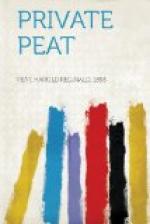The folks, of course, took all these little pranks good-naturedly; and, as a Canadian, I can not speak too highly of the treatment handed out to us by the Britishers. If there ever was a possibility before this war of Canada’s breaking away from the Motherland, such a possibility has been shot to the winds. No two peoples could be more closely allied than we of the West and they of this tiny but magnificent island.
The little training we had had in Canada was good, as far as it went, and we had devoured it all. But the most vital part of a soldier’s up-bringing was absolutely forgotten by our officers—discipline! As I’ve said before, as far as discipline was concerned, we were a joke. Certainly we were looked upon as such by the Imperial officers.
In one of the leading British weeklies there appeared a series of comments reflecting rather seriously on our discipline. One of the most humorous yet caustic, it seemed to me, was of an English soldier on guard at a post just outside of London. His instructions were to stop all who approached. In the darkness it was impossible for him to distinguish one person from another. Before long he heard footsteps coming toward him:
“Halt! Who goes there?” demanded the sentry.
“The Irish Fusiliers,” was the answer.
“Pass, Irish Fusiliers; all’s well.”
Before long some more steps sounded....
“Halt! Who goes there?”
“The London Regiment.”
“Pass, Londons; all’s well.”
“Halt! Who goes there?”
“Hic ... mind your own damn business....”
“Pass, Canadians; all’s well.”
At a parade, one bright November morning, when we were at Salisbury, a certain brigadier-general from Ontario, since killed in action, while reviewing the soldiers of a particular battalion, made a unique speech to the boys when he said:
“Lads, the king and Lord Kitchener and all the big-bugs are coming down to review us to-day, and for once in your lives, men, I want to see you act like real soldiers. When they get here, for the love o’ Mike, don’t call me Bill ... and, for God’s sake, don’t chew tobacco in the ranks.”
There is no doubt about it, the authorities probably looked on us as a bunch of good fellows, but that’s about all.
While still in England, all the men of the First Canadian Contingent were issued a cloth lapelette or small shoulder strap; the infantry, blue; the cavalry, yellow with two narrow blue stripes; the artillery, scarlet, and the medical corps, maroon. I was told that these lapelettes were given to distinguish us from other contingents. To-day there are only a few hundred men entitled to wear what now amounts to a badge distinction. Personally, I feel prouder of my blue lapelette than of anything else I possess in the world.
The so-called training that we were supposed to have in England was not really any training at all. The rain was almost continuous, we were constantly being moved from one camp to another, and training, as training is understood to-day, was out of the question.




